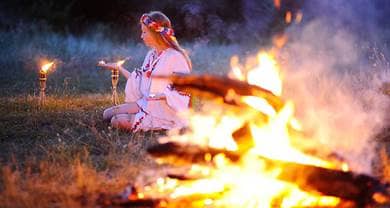- Trending:
- Pope Leo Xiv
- |
- Israel
- |
- Trump
- |
- Social Justice
- |
- Peace
- |
- Love

RELIGION LIBRARY
Paganism
Ultimate Reality and Divine Beings
Few, if any, Pagans orient themselves to a concept of divinity that is situated "above" or "beyond" nature. The monotheistic worldview - belief in a single God who fully transcends the physical universe, which God has created and that therefore is not God - is rejected by many Pagans as dualistic and consequently hostile to nature. By contrast, most forms of Paganism entail some sort of recognition that nature is in itself sacred, or divine, and worthy of human respect, honor, and adoration. But the ways in which such respect and adoration are expressed differ widely among different Pagan traditions, and metaphysical beliefs or concepts - such as the idea that all of nature can be related to as a single Goddess - can likewise take many forms.
For some Pagans, nature is simply venerated for its own sake, without any metaphysical concepts to undergird such adoration. At its purest level, such nature mysticism exalts the empirical, measurable physical cosmos above any metaphysical or spiritual concepts and beliefs. In this view, nature is holy precisely because nature is all that we have. While the human imagination is a rich and powerful force for creating meaning and joy, such mental activity cannot be proven to point beyond nature, and therefore (according to this view) should be regarded as part of nature. The manifest physical reality of nature makes it the necessary foundation upon which this approach to spirituality rests.
Another view holds that nature is basically one with the goddess, or the god and the goddess, or some other combination of divine personages. Revering nature and venerating a god and/or goddess and/or multiple gods need not be a contradictory set of actions. A mythical or spiritual approach to nature need not be a denial of the foundational goodness of the empirical world. In its most simple form, this spiritualized veneration of nature is a form of pantheism - the belief that all things are divine, and the divine is in, and one with, all things. It is also monistic (monism is the belief that everything ultimately is united in one all-encompassing divine reality). Within this approach, worshipping nature and worshipping the divine are identical acts.
In a slight variation of pantheism, Pagans may honor nature as the "body" of the divine person or persons, similar to how human flesh and blood is the body in relation to the human soul or spirit. Just as the human entity consists of both an external body and an interior mind or spirit or soul, so too could the physical cosmos as a whole be understood as the "body" of a divine being. This divine entity, like human beings, has both a body and a soul - the earth (or the cosmos as a whole) is therefore the "body" of the deity (or deities). This way of seeing nature and divinity can function as a religious variation of the Gaia hypothesis, a scientific hypothesis that the earth is a unified biosystem (although strictly speaking, science does not speculate on whether or not the "Gaia" system has a spirit integrated with its terrestrial body).
In contrast with pantheism, another approach to divinity within nature religion is polytheism, the belief that the earth (or the cosmos as a whole) is the material home to a multiplicity of gods and goddesses and/or other spiritual beings. Integrally connected to the material world is an "otherworld" - a spiritual realm - that functions as the home of the deities and other spirit beings.
Yet another Pagan belief system, animism, holds that spirit or consciousness pervades all material things - that every animal, plant, and inanimate object has its own spirit worthy of respect if not veneration. This view of nature holds that all things are enchanted, and are alive, even if at a very low level of consciousness (e.g., rocks) - and, therefore, are sacred. Yet another perspective emphasizes the idea that humanity is divine, and nature is holy simply because it is home.
This list is not meant to be exhaustive, but rather to demonstrate the tremendous diversity of beliefs that can be anchored in Pagan spirituality. The most common factor is the notion that nature is sacred, regardless of what mythological or metaphysical beliefs may justify that core belief. Even those Pagans whose beliefs may be entirely oriented toward spiritual beings rather than toward nature veneration usually do not reject nature as "fallen" or somehow inferior to the spiritual world.
Study Questions:
1. Why do Pagans reject a monotheistic worldview?
2. Why is nature seen as holy?
3. How does thinking about nature as “the body” contribute to Pagan spirituality?
4. What is animism, and why is it a part of a Pagan belief system?










